#<- for ease of access
Explore tagged Tumblr posts
Text
"Did you get sick?": nope, i was fine. Everyone talking abt throwing up from bad tastes is a coward tbh, even with how absolutely Wrong it tasted on every level and how my brain immediately said I was about to fucking die and I needed this Out Of Me I didn't throw it up. I was fucking stoic.
"Did you get sick (long term)?": Nope. Like I said, bacteriophage virus. I had been studying this thing for a while, as well as the bacteria it infects - I knew for certain it couldn't affect me. Nor my microbiome. The bacteria clade affected isn't found in the human gut unless something has gone very wrong, which wasn't the case for me at the time lmao. The only thing it killed was my perspective on how bad is bad tasting
"What color was it?": Kinda brown
"Did your lab director ever find out?": He did not. Like I said, I was beautifully stoic. And also left the lab to go down an entire fucking water bottle immediately afterwards. (It did not help. I was tasting that shit for a week.) Also, it was leftover sample to be discarded anyway that I drank - it just so happened that instead of a biohazard wastebin, it was disposed of in my mouth
"WHY?":
For science.
#here. a qna!#all my answers have been tagged as 'qna' btw#go check the tag out if ur curious#and for ease of access#qna
967 notes
·
View notes
Text
My fics/essays can be found under the tag #my writing
0 notes
Text
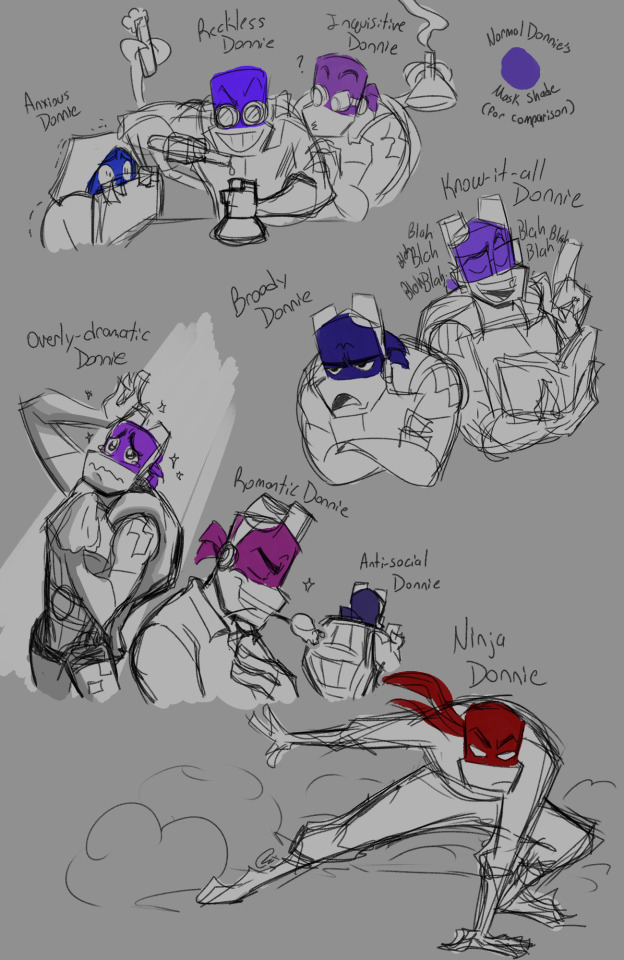
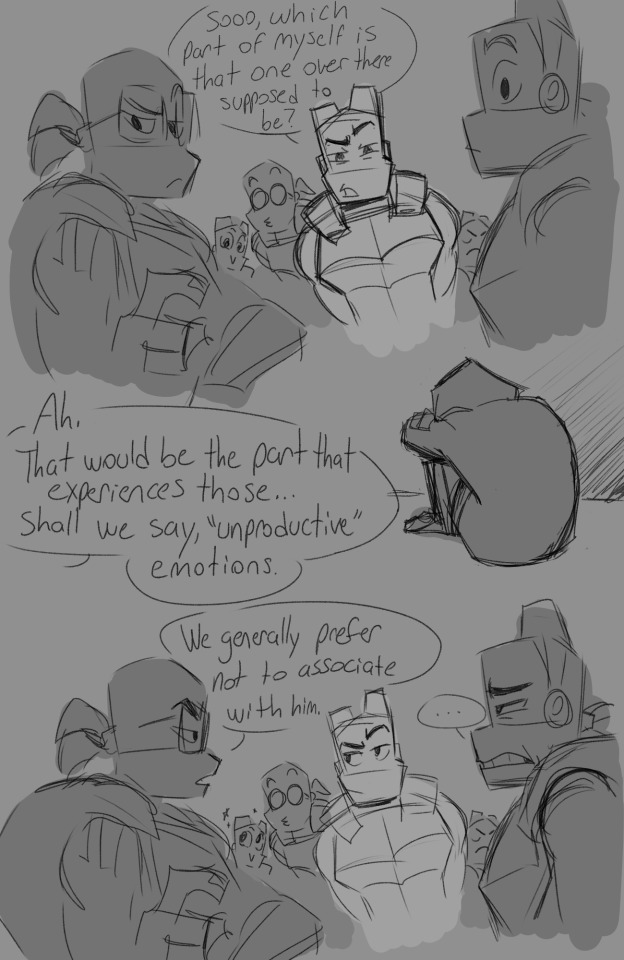
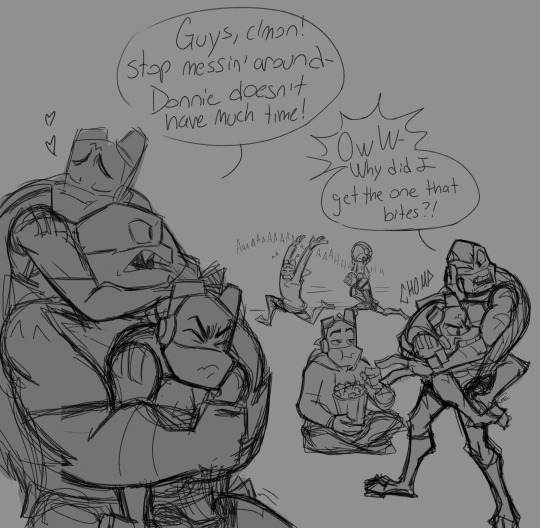
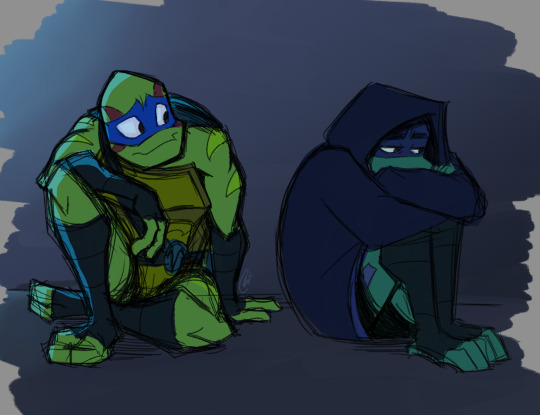
I had an idea for a one-off Rise episode plot and just wanted to quickly sketch up some visuals for it.
The plot goes as follows: Donnie attempts to invent a cloning machine and, due to some kind of science-y mishap, ends up cloning himself...a lot. But there's a catch to this - the clones aren't exact copies of Donnie, they each possess just ONE of the various facets of his personality (i.e. brainy, broody, sarcastic, passionate, dramatic, mischievous, etc.) and a small portion of his mystic powers. Don tries his darnedest to keep the whole situation under wraps while he searches for a way to fix it, but some of the more rambunctious Donnies quickly escape and begin stirring up trouble in the Lair, so it doesn't stay a secret for very long. To make matters worse - the real Donnie starts to slowly disappear (something having to do with his existence being divided among the Donnies or blahblahblah fake science explanation). So, while he and the scientist Donnies continue to look for a way to reverse the cloning effect, his brothers and Co. set to work gathering up all the other Donnies so they can put them back where they belong and keep Donnie Prime™ from vanishing.
Hilarity, wholesomeness (and some mild angst) ensues.
(Note: I meant to include April in that second-to-last image, but ran out of room. Just know that she, Splinter, and probably Casey Jr. are all there, as well.)
#I always love plots that have a healthy mix of whimsy and emotional weight. Bonus for DT bonding.#rottmnt#rise of the tmnt#rise of the teenage mutant ninja turtles#disaster twins#rottmnt donnie#rise donnie#donatello hamato#rottmnt leo#rise leo#leonardo hamato#technically all the boys are in there but I'll just tag the ones with the most focus...esp since mikey's tiny lol#fanart#concept art#chiscribbs#Fun game idea for the tag-readers: what name would you give this ep if it were real? I'm eagerly awaiting suggestions.#shades of purple (rottmnt)#<- added in post for ease of access
5K notes
·
View notes
Text

my dearest
#shadow the hedgehog#maria robotnik#sonic the hedgehog#my art#this is from way back when the animation released i forgot to post#you can tag shadria if you want they were written beautifully romantic in the story so i cant complain#this wasnt necessarily ship art but ill still tag for ease of access#shadria
367 notes
·
View notes
Text

hi!!! this is a geno themed blog B) i attempt to draw him every day sometimes
you can send asks questions to either me or geno! :-3
my main is @vanglaggle !!
proship, terf, radqueer, dni please and thank you
please request other characters including geno! i don't draw them individually.
do not tag any of my ship art as sanscest. i'd prefer you use mirrorshipping (like i will) if you need to block the tag.

#dailygeno - daily art !
#omg...geno!! - other's art
#genotext - talking .... about him
#notgeno - if it's ever like . not geno (rare)
#notdaily - when i draw him and it's not the daily drawing
#other characters - when other au guys are there
#double post - self reblogging
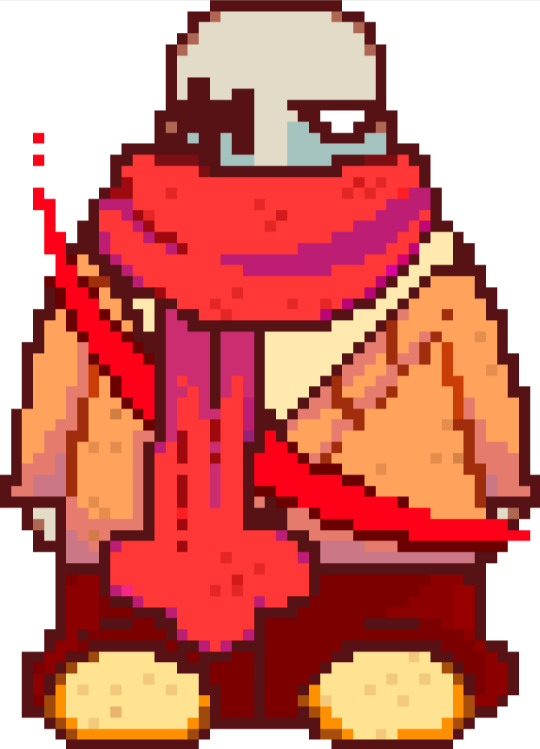


geno themed dividers , heart monitor divider , blinkies




#intro post#blog intro#blog info#utmv ask blog#for ease of access →#dailygeno#omg...geno!!#genotext#notgeno#notdaily#other characters#double post#gif
199 notes
·
View notes
Note
Do we know if Miles or Alex have any nicknames for each other?
oh boy. they have QUITE a few lol. i think miles generally calls alex "al", and then we also have this list of insanity:
“yoko” - at the end of the ep version of aviation
“the little diamond” - miles talking about alex’s new quiff
“you naughty turtle” - paradiso, amsterdam 2016
“baby” - multiple times
“you scampi fry” - the guardian
“the wirral squirrel/wirral riddler” - alex on absolute radio 2011, at around 10:50
“shavambacu” - is this what you wanted cover at rockwave athens 2016, at around 4:01
“the kane train” - lowlands festival 2016
“the boy” - not sure which interview this is from, but i think it's 2016
“my miles” - my rock interview 2016
“my alex” - live performance, 2011
“darling” - el país interview 2016
"the little prince" - NME interview 2008
if anyone has any others then please feel free to add them! in other words, they are ridiculously loud and ridiculously insane 🫠
#just copy pasted the list from my linked post for ease of access!#and then added a couple new ones 🥰#milex#asks
126 notes
·
View notes
Text
Hey so this is insane
70 notes
·
View notes
Text








Redrew Fire Spirit's sprites to fit the AU.. may or may not do this with the rest of the cast
#mod canid#canid's art#dragon curse au#cookie run#cookie run kingdom#crk#cookie run ovenbreak#crob#fire spirit cookie#you can also find these in the drive for ease of access!
94 notes
·
View notes
Text
for those who missed the stream or just want to watch it again, here’s jeremy’s full pov of his minecraft stream with the rest of the achievement hunter crew!
youtube
#jeremy dooley#dooleynotedgaming#achievement hunter#roosterteeth#rooster teeth#i forgot to link it directly in the ask i just answered#so i’m just making a separate post for ease of access#💃💃💃#jack also uploaded his pov but i don't remember who else >_<
162 notes
·
View notes
Text
things we learn about scully in s1
she has a godson (and she told his mother that she thinks mulder is cute)
she did her residency in forensic medicine
she's good with dogs and is naturally drawn to all kinds of animals (even evil-looking monkeys)
she wants to keep her christmas tree up all year because her father always made her take it down as soon as the holiday was over
(and she was never positive that her father, who was in the navy and involved in the cuban blockade, was truly proud of her, because she joined the FBI instead of becoming a full-time doctor like he had wanted)
((and he didn't say "i love you" the last time he spoke to her. ouch))
when she was 14, she stole one of her mother's cigarettes, which she thought was disgusting, but she wanted to do something Forbidden for once
she once forgot her own birthday (which is february 23rd) when she was studying for her exams
she has a little cat sign on her apartment door <3
when challenged by the preacher's kid, she refused to deny the power of God; she was raised catholic, and remembers that "God never lets the devil steal the show"
(she's almost always wearing a cross necklace, even while declaring that she considers science sacred)
((and yes, her favorite movie is the exorcist))
she took some biology courses on bugs and is now going to tell you some bug facts
she has two brothers, one younger and one older
her dad- with whom she did not have the greatest of relationships- nicknamed her "starbuck"
(he called her this after the steady and rational first mate character from moby dick; all the more cruel when you consider he pushed her aside for joining the FBI rather than doing the "logical" thing, becoming a doctor. to cast her in a role of the dutiful daughter without her permission and then create a conditional sense of love is just. so mean. it's a miracle she didn't turn out as emotionally repressed as he did)
#i TOLD you i store all of these facts in a little spot in my brain! and compile them for ease of access when needed!#we didn't get as much scully lore in s1 as we did mulder lore but i'll make that post another time. perhaps tomorrow.#she also seems to need a constant IV drip of caffeine which i think is endearing#nicknaming her after the guy from the whale book who was supposed to be even tempered and level headed is lowkey evil#i'll get back to that another day but like. to reject her when she fails to do the “logical” thing and become a doctor?#ugh just says so much about how she grew up. and maybe we'll learn more later so i shouldn't jump too far ahead.#anyway! love to observe tiny things about characters that help formulate their worldview <3#and i look forward to learning much more!#the x files#txf#dana scully
139 notes
·
View notes
Text
something lost in the "sylus is NOT like THAT" with that ranging from all the various kinks people have deemed he'd never ever be into (because "he's not a red flag, he's not a dark romance guy, he's a softie simp") is that he has a range from making the mc shoot him after trying to force a resonance for over three days all the way to the sweetest boyfriend experiences. he's nuanced and complex and that's fun! he's got range and sides to him!
above all, the very fact that he does open up to such depths of devotion and adoration is the core of why having him do a lot of nasty hard BDSM is hot — if he knew you were into it, he'd respect the boundaries you laid out and do it because he wants to service you. if you want to be degraded, tied up and made to gag on his cock, he'd do it because he finds pleasure in being of service. to you. on your terms.
do you see the difference?
#♡ magdalence talks#bottom line he's such a green flag and that's why i love seeing him do nasty deep kinks#bc he'd be attentive!#the aftercare would be amazing!#and knowing what you want and drawing it out of you and making it come true#speaks to something so deep and hidden and forbidden#that he just accesses with ease because he can evoke trust#because he is devoted. adoring. respectful#l&ds sylus#sylus love and deepspace#love and deepspace sylus#lads sylus
67 notes
·
View notes
Text












⟟ Updated 『TRIP』 album directory. (& misc helpful ensemblesongs tags!)
The previous post had exceeded the limit of links, and, reblogs don't update on their own, so this might be useful! This post was very tedious to prepare & write by hand, but I live to make lives easier. So!
The amount of links may be overwhelming to some and useful to others. This post will be updated from now on regarding the last few trip albums in particular, the old one will go untouched...🖋 for the old post, look here.
☆ Crazy:B TRIP album | Unit Tag
Rinne Amagi | HiMERU | Kohaku Oukawa | Niki Shiina
☆ Ra✽bits TRIP album | Unit Tag
Tomoya Mashiro | Nito Nazuna | Hajime Shino | Mitsuru Tenma
☆ Double Face TRIP album | Unit Tag (MaM)
Madara Mikejima | Kohaku Oukawa
☆ fine TRIP album | Unit Tag
Eichi Tenshouin | Wataru Hibiki | Tori Himemiya | Yuzuru Fushimi
☆ Valkyrie TRIP album | Unit Tag
Shuu Itsuki | Mika Kagehira
☆ ALKALOID TRIP album | Unit Tag
Hiiro Amagi | Aira Shiratori | Mayoi Ayase | Tatsumi Kazehaya
☆ 2wink TRIP album | Unit Tag
Hinata Aoi | Yuuta Aoi
☆ UNDEAD TRIP album | Unit Tag
Rei Sakuma | Koga Oogami | Kaoru Hakaze | Adonis Otogari
☆ AKATSUKI TRIP album | Unit Tag
Keito Hasumi | Kuro Kiryuu | Souma Kanzaki
☆ Trickstar TRIP album | Unit Tag
Hokuto Hidaka | Subaru Akehoshi | Mao Isara | Makoto Yuuki
☆ RYUSEITAI TRIP album | Unit Tag
Tetora Nagumo | Shinobu Sengoku | Midori Takamine | Kanata Shinkai | Chiaki Morisawa
☆ Switch TRIP album | Unit Tag
Natsume Sakasaki | Tsumugi Aoba | Sora Harukawa
☆ Eden TRIP album | Unit Tag | Adam & Eve
Nagisa Ran | Ibara Saegusa | Hiyori Tomoe | Jun Sazanami
☆ Knights TRIP album | Unit Tag
Tsukasa Suou | Leo Tsukinaga | Izumi Sena | Ritsu Sakuma | Arashi Narukami
#☆ Once more this has been done for ease of access :-) I'll also be tagging so it can be navigated easily in case.#crazy:b#ra*bits#double face#fine#Valkyrie#alkaloid#2wink#UNDEAD#akatsuki#ryuseitai#trickstar#man at that point you can look it up yourself. actually.#ex-fine#five eccentrics#ex-valkyrie#<- what else do you want.#꒰💭꒱#Enstars
244 notes
·
View notes
Text
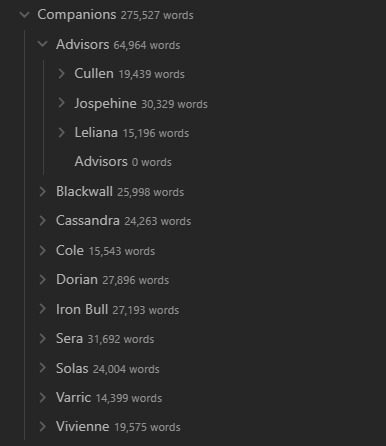
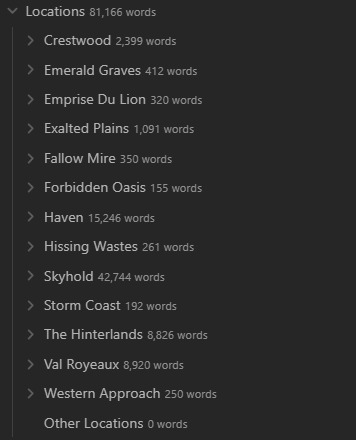
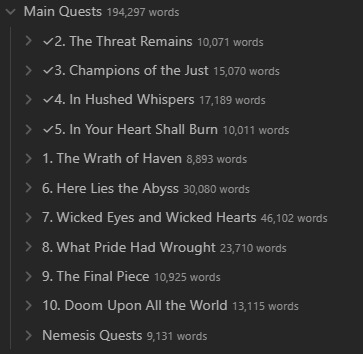
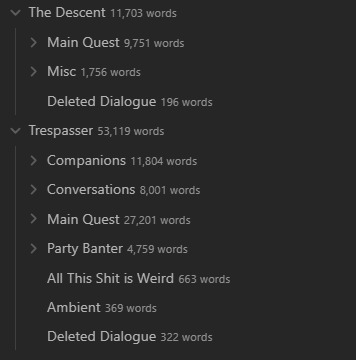
(current wc total: 615,812) Word count breakdown so far for this project! Locations are still in-progress, and some of the main quests were transcribed before I knew how to access the files (thus the out-of-order list) so they may still be missing content.
#dragon age inquisition#just idle chatter#for the curious#bearing in mind that i have a few repeat scenes that varied too much based on certain conditions so i just made a whole new post for them#between veilguard transcript posts i've been trying to edit some of the older stuff to start my re-formatting endeavors#joh has been transcribed by another blog but i might try to organize them into a masterpost here (with their links) for ease-of-access#and i'm currently still waffling on companion banter since they're all already on the wiki#you know#becuase i didn't already fill my plate and three more plates with the other games lol#long post#ish#mostly just big images
51 notes
·
View notes
Text
Useful Ghostbusters resources/sites that I like to use ->
Images.
GBfans' image gallery (features subcategories for all 5 movies, the cartoons and props across all films, has screenshots, bts, art, etc.)
Ghostbusters official gallery and archived assets on the GBwiki
'Ghostbusters: The Ultimate Visual History' archived on Internet archive, this one is so good for all manner of character and prop design art
Screencap collection (as described)
Ghostbusters Reference Library, archive of reference materials for all 5 movies and the game. Thank you to this anon for informing me of it!
GBprops (I believe this got meshed with GBfans but the original site has useful fan and canon reference images for equipment, ie. proton packs)
Reading.
Archived copies of the novelisations are available both on the Internet archive and Spookcentral. Ghostbusters I has two novels, one by Larry Milne and the other by Richard Mueller. II has a few, but the two most 'adult'-orientated one's were by Ed Baha and B. B. Hiller (I've linked the IA copies, but you need an account to borrow these, pdfs are available for free on SC)
Scripts for Ghostbusters I and II
'Making Ghostbusters' by Don Shay scan archive (also has lovely concept art and bts images)
'Ghostbusters: The Videogame' guide, surprisingly full of interesting tidbits and character writing (and the stylised one here - shorter and less in depth)
Misc.
Spookcentral (great for most archived copies of scripts, books, deleted scenes, some bts, etc. for gb1/2 and afterlife)
Role-playing manual. Interesting assets, ideas and some fun illustrations
GBnews!! All sorts of assorted fun things here
The archive of Ghostbusters HQ (now defunct), has all sorts of fun, older goodies on it. I just enjoy browsing old sites I think
#ghostbusters#resources#thought i would share these!#and also posting them for ease of access#olliepost#refs
45 notes
·
View notes
Text
slowly regrowing my claws (nails) again /pos
#nonhuman#alterhuman#therian#therianthropy#otherkin#painting nails really helps so much#cuz otherwise have a biting habit that's also a stim that's really hard to break#but the visual colour on the nails acts as a reminder to not bite#and so like it takes a while but they're growing#and bonus black nailpolish just completes us I swear#we have the black nailpolish in our room now for ease of access too so woohoo!!
29 notes
·
View notes